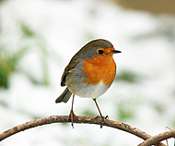Why don't robins get fat?

(PhysOrg.com) -- New research by the School of Biosciences is shedding light on the reasons why the European robin doesn’t get fat -even though they are feeding for much longer.
Artificial light has been present in our environment for a long time. However, it is only recently that research has found that street lighting and other artificial lights, like those coming from buildings, are having adverse affects on many organisms.
Research has already established that bird song is affected by artificial light but until now, little was known about the effects it has on the feeding habits of organisms.
Researcher Alexandra Pollard who is part of the School’s Biodiversity and Ecological Processes Group, has been studying the activities of robins in an attempt to uncover whether increased artificial light affects the amount of food consumed.
Funded by a Natural Environment Research Council (NERC) studentship, Alex found that artificially lit European robins have different activity schedules to those that are under natural conditions. And furthermore, that they have the ability to regulate their body masses differently.
Alexandra said: “We have found that robins under artificial lighting conditions begin their daily activity far earlier than when under natural unlit conditions. However, even though they are active for longer and have food available overnight, they lose a similar amount of body mass to unlit robins - something we didn’t expect to find.”
“We thought that that if food was freely available the robins would consume as much as possible, to maximise their energy reserves, but they gradually consumed their freely-available food over their longer activity period than those under natural conditions.
Although this suggests that streetlights do not adversely affect the robins ability to regulate their body mass, this still does not mean that other aspects of bird behaviour, such as breeding are not affected by lighting. It is important to remember that many other organisms are known to be affected by artificial light, including invertebrates, amphibians, reptiles and mammals, and risks need to be minimised. Further research is therefore needed into the long and short-term consequences of lighting, especially in conservation.”
Alexandra’s work contributed to the recently published Royal Commission on Environmental Pollution report on Artificial Light in the Environment.
Provided by Cardiff University












